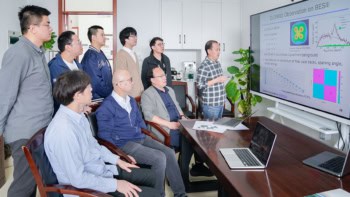Why do many science graduates lack the skills that industry is looking for? Sean Ryan and Veronica Benson of the South-East Physics Network explore the problem and discover that there is one straightforward way for universities and businesses to address this

There are several big challenges in physics where we are constantly told to “mind the gap”. There’s the gender pay and promotions gap. There’s the student attainment gap. And then there’s the graduate skills gap, which refers to the difference between the skills commonly exhibited by physics graduates and the skills employers commonly report as being required. All three gaps can be confusing and frustrating for students, academics, industry and government, but progress in the skills gap is fortunately being achieved.
In 2019 we, the South-East Physics Network (SEPnet), were challenged by a group of university leaders to characterize this physics skills gap: what skills were missing, why and which actions were proving effective in addressing it. We took initial lessons from the Higher Education Academy, UK Physical Sciences Centre’s extensive 2010 study Skills Required by New Physics Graduates and their Development in Degree Programmes by Steve Hanson and Tina Overton. We also considered many industry, university and political voices that have shaped the issue subsequently, not least the 2016 Wakeham Review of STEM Degree Provision and Graduate Employability.
A joint problem
Crucially, we acquired insights from hundreds of physics students and employers who have taken part in the SEPnet Employer Engagement programme. Consistently, one activity stood out as particularly beneficial: short, structured, paid summer work placements. Moreover, such placements can benefit employers in all regions of the country – not just in the capital – as well as small and medium-sized enterprises (SMEs) in a range of different sectors. This key finding and others are outlined in our recent report The Physics Graduate ‘Skills Gap’ – What it is and How to Address it.
Universities and businesses need to work together, in effective and meaningful ways, to reduce the impact of the skills gap on physicists’ futures and on industry
The report found that universities and businesses need to work together, in effective and meaningful ways, to reduce the impact of the skills gap on physicists’ futures and on industry. There is also an onus on academia to make sure that physics departments are providing the specialist and transferable skills that graduates need and employers seek. Employers of physics graduates continue to cite the importance of both technical and transferable skills – they do not want to see the core physics content diminished or degraded. Nevertheless, employers frequently report that physicists’ transferable skills (often described as soft skills) tend to be poorly developed – students, for example, often lack commercial understanding. Such messages can put students and academics on the defensive, so it is important not to view the debate as a blame game.
Indeed, the skills gap may equally be considered an expectations gap on the part of employers, reflecting the mismatch between what individual employers expect from graduates, and the experience students can reasonably develop over three or four years in a non-commercial university environment. Closing the skills gaps requires co-operation, not antagonism, between students, universities and employers.
Short, structured, paid
The potential to address the skills gap by placing students in physics-related work mid-way through their degrees is not rocket science. However, the historical sandwich-degree model, which involves a full-year placement during a degree, has rarely achieved a high uptake. SEPnet students pointed out some of the core failings of that model – a year added to their degree, the opportunity cost of delayed graduate employment, and the dephasing of their study paths from that of their peers (with knock-on effects for social support and accommodation). In contrast, the SEPnet eight-week summer placement scheme provides enough time for students to develop some commercial awareness, and to understand how their knowledge and skills relate to industry needs, but is not so long as to disrupt their degree-completion timescale, earnings trajectory or peer networks.
For employers, such an eight-week placement scheme represents a much lower financial and human-resource risk than a traditional placement scheme. It has also proven to be well within reach of many SMEs, for which a full-year placement may be beyond consideration. Feedback from both students and employers alike is positive, despite the placement only being two months long. Moreover, SEPnet’s short placement scheme is also open to PhD students during or at the end of their thesis, providing them with equivalent opportunities to develop industry-relevant skills, while also enabling employers to explore higher-skilled graduates.
These summer placements are not just short, they are also structured and paid. The existence of a structured scheme ensures that the diverse pool of undergraduates from across the nine SEPnet member universities can participate, crucially including students who do not already have social connections in physics-related industry. While an employer’s efforts to find a work placement for the child of an employee might engender staff goodwill, it can also perpetuate gender and racial stereotypes seen in physics-based industry.
In contrast, in the summer 2020 cohort of SEPnet placement students, 32% were women and 24% were from BAME backgrounds. Paying the placement students, even at the modest level of the SEPnet scheme, is similarly important. By doing so, both employers and students can attach monetary value to the scheme in addition to its non-monetized benefits, and avoid excluding students who are not able to sustain a summer of unpaid work.
The principal limitation on the SEPnet scheme is the number of employers offering placements – typically 75 students undertake placements each year, but four times that number submit full applications. If graduates are not exhibiting the full range of industry-relevant skills that employers desire, it is clearly not because of any unwillingness from students to develop those skills.
Crucial experience
Physics students across the UK – not just those we meet through SEPnet – need more businesses ton provide short, structured, paid summer placements that will let them develop industry-relevant skills in employment. Universities, for their part, need to ensure that students focus on the applicability and transferability of their knowledge and skills, and that they are materially supported in gaining crucial experience that the university alone cannot provide.



